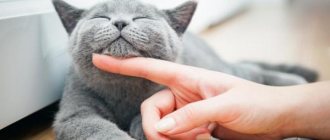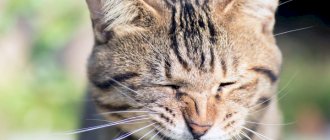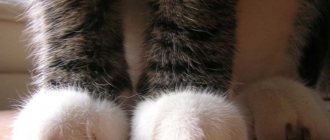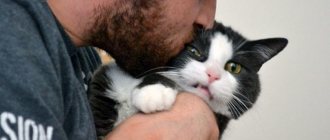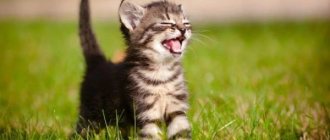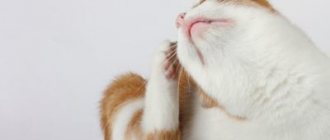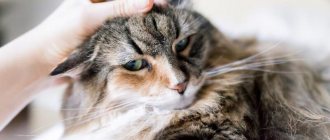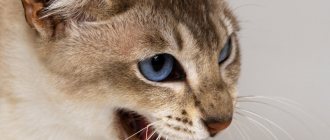Should I be concerned if my cat is constantly licking itself? In some cases, the owners' fears are indeed justified, but more often than not, the pet's behavior can be explained after a short observation. Your job is to cover as many suspicious signs and possibly symptoms as possible.
Many owners find it funny if a cat licks itself frequently. However, there is nothing funny about the intense production of saliva, because that is why the cat licks itself. Your pet is not necessarily sick; they may be experiencing discomfort or stress. When it comes to the disease, in addition to frequent licking, the clinical picture also contains more striking symptoms. In any case, if your ward licks himself too often and intensely, his behavior needs to be observed.
Natural causes
Natural causes include everything that happens on an instinctive level. Reflex licking is harmless and does not require outside intervention.
Hunger or thirst
Intense production of saliva is caused by a delicious smell, as well as the sight of the food itself, if the cat has not eaten for a long time. This reflex facilitates subsequent chewing and swallowing of food.
Don't forget about thirst. The desire to drink increases in hot weather and when eating dry kibble. If there is no constant access to water, then due to thirst the pet will often swallow and lick itself.
Washing after eating or drinking
A cat licking its lips should not surprise its owner immediately after eating or drinking. In this way, it removes food debris and its smell, and also licks off excess water.
Maintaining normal spout moisture
In the absence of pathologies, the nose of mustachioed pets is wet and cold. The appearance of dryness and warmth, eliminating illness, is acceptable during sleep and in hot weather. In both situations, cats lick vigorously, trying to regain lost phlegm.
Fur stuck on tongue
After washing, rare fragments of fur get stuck on the rough tongue. They cause discomfort to the animal, so to remove them the body stimulates the production of saliva. Because of this, the cat has to lick itself more often than usual.
Preventing itching
Carry out hygiene procedures as often as possible - wet cleaning, washing cat bowls and washing their bedding.
Regularly clean your pet's ears and treat them with special medications.
Provide your pet with a balanced diet and try to prevent it from coming into contact with other animals.
Now everything has become clear why a cat can lick and itch. To solve the problem with a cat licking, you will have to be patient and time
And it doesn’t matter whether it’s a psychological or physiological reason. By providing your pet with enough attention and proper care, you can count on the fact that after some time his life will return to normal and his coat will be restored.
Why a cat constantly licks itself: pathological reasons
Dangerous causes are accompanied by accompanying symptoms and an increase in the number of daily washings. Hygiene procedures occupy most of the waking hours, and the general condition of the mustachioed pet gradually worsens.
Nausea and conditions preceding vomiting
If your cat frequently licks and swallows, the reason for her strange behavior is most likely due to impending vomiting. Before an attack, animals wash only their faces, ignoring other parts of the body.
Nausea itself is not an independent disease. It accompanies gastrointestinal diseases, helminthiasis, poisoning and other dangerous pathologies that require the intervention of a veterinarian.
Nervous disorders
Mental problems should not be ruled out. These include stress and phobias. The former are associated with increased nervous tension, and the latter with severe fear that defies logical explanation.
Washing removes unpleasant odors, so whiskered pets feel calmer after washing. Rubbing against surrounding objects also helps them. In this way they distribute their pheromones secreted by their facial glands.
Diseases of various body systems
Another possible diagnosis option is systemic diseases. These include:
- Diseases of the urinary system (renal failure, ICD). The cat urinates frequently and drinks a lot. Severe nausea due to intoxication and weight loss are noted.
- Gastrointestinal pathologies (gastritis, pancreatitis, dysbacteriosis). Accompanied by stool disturbances, vomiting and loss of appetite.
- Diabetes. Lack of glucose leads to excessive and frequent urination, increased thirst and appetite, as well as rapid weight loss.
- Tumors in the oral cavity. Causes intense salivation and pain. Due to unpleasant sensations, the pet refuses food, but constantly approaches the feeder, feeling very hungry.
At the initial stage, most of these diseases are asymptomatic. A clear clinical picture appears only after complications, so until this point only a veterinarian can make a diagnosis.
Foreign body entry
Another reason why a cat constantly licks and swallows is the entry of a foreign body into the oral cavity or its ingestion. In the first case, the body tries to remove the foreign object on its own - through excessive salivation and vomiting. In the second case, these methods do not work, so the swallowed object is removed surgically.
Poisoning or infection
An attack of vomiting, accompanied by frequent licking, diarrhea and high fever are characteristic of intoxication of the body. It is caused by poisons, chemicals, spoiled foods and infections.
Problems with teeth or gums
Problems with the oral cavity should not be ruled out. Constant licking due to excess saliva occurs with caries, pulpitis and periodontitis. All these diseases can be accompanied by a putrid odor from the mouth, increased swallowing and loss of appetite.
Helminth infection
The risk group includes cats that walk outside and eat raw meat or fish. Parasites can be recognized by severe itching, weight loss, diarrhea, deterioration in coat quality and bloating.
With helminthiasis, a cat licks wounds on the body that form due to scratching. Because of this, they can easily get a secondary infection, so at the first signs of infection, you need to make an appointment at the veterinary clinic.
Skin problems causing itching
Scabies appears not only due to worms, but also due to other skin problems. These include:
- Allergy. The symptoms of the disease depend on its cause. The cat may experience skin rashes, diarrhea, vomiting, runny nose and local baldness.
- Dermatitis. The main symptom of dermatitis is the presence of inflammation on the skin. It peels and turns red, or becomes wet and ulcerated.
- Flea infestation. Flea bites are not only painful, but also dangerous. These parasites carry deadly infections, and their saliva often causes allergies.
Please note that cat fleas do not disdain human blood at all. Unlike their brothers, they easily adapt to new owners. Thanks to this, flea infestation is very easy to distinguish from other diseases that cause itching.
Diseases of internal organs
Increased salivation may be a sign of some diseases of the animal’s internal organs:
- genitourinary;
- gallbladder;
- liver;
- kidney
Most pathologies of internal organs in the initial stages of development are asymptomatic.
The first signs appear only as the disease progresses. Accordingly, not every owner will be able to independently determine the disease. Therefore, the diagnosis should be carried out by a veterinarian.
If the animal’s condition is too serious, it cannot be postponed; you must immediately contact the clinic for examination. Timely diagnosis will allow you to quickly get rid of the disease and prevent it from becoming chronic.
Helping your pet at home
Before contacting the veterinarian, be sure to note the accompanying symptoms and remember all recent events. You can solve the problem by eliminating the root cause:
- Nervous disorders. Attention (affection, playing with a rope) and sedatives with pheromones will help cope with stress. If it's all about fear, change the conditions of detention. Most often, mustachioed pets suffer from claustrophobia, so they need more personal space.
- Entry of a foreign body into the oral cavity. If the object is not deep, remove it with tweezers.
- Poisoning. At home, it is permissible to provide first aid aimed at slowing down the intoxication process. This includes gastric lavage, taking sorbents, giving an enema and rinsing the skin from toxic drugs.
- Flea infestations and helminthiases. Most antiparasitic drugs can be taken without prescription. Exceptions include young age, pregnancy and severe disease.
- Allergy. If you know the allergen, then try to get rid of it: change food, shampoo and other possible irritants. If there are no changes, use antihistamines.
In all other cases, treatment is selected by the veterinarian. Depending on the condition, the pet may require not only conservative, but also surgical therapy.
Preventive actions
Fungal and bacterial infections can be prevented by practicing good hygiene. Special medications and treatments will help protect your cat from lichen, dermatitis, otitis media and other diseases. For prevention, you need to regularly treat your pet against fleas, ticks and fungi, and also wash the bowl and tray with disinfectants. Bathing with a special shampoo is beneficial for cats. This procedure only needs to be done once a year.
Important! After treating a kitten with anti-flea or anti-fungal products, the animal should not be bathed. It is forbidden to wet the area where the medicine was applied
The cat licks itself to help itself
Sanitizing the tray and bowl
All items belonging to the cat - bowl, tray, toys, etc. - must be regularly washed and treated with disinfectants. This will protect your pet from infectious, fungal, viral and other diseases. The bowl can be washed with regular dishwashing detergent. Usually fungus does not form on a cat's bowl, most often in the tray. It is advisable to treat it with any antifungal spray against lichen. Additionally, you can treat the tray with camphor alcohol, which not only cleans and disinfects the surface, but also eliminates unpleasant odors.
The bowl and tray should be washed and disinfected regularly
Special flea products
There are many treatments available at pet stores for fleas and other external parasites. They are available in the form of drops on the withers, sprays and collars. It is advisable to treat the cat with drops on the withers; this is the most effective remedy. The room can be sprayed with flea spray. Flea collars are not very effective. It does not destroy insects, but only repels them. A collar can only be put on a cat if it has recently been treated for fleas. Flea drops such as Leopard, Frontline, Advantage, Inspector, and Bolfo spray are very effective.
Flea remedies
Antiseptic treatment against fungus
To protect your cat from ringworm, you need to use antifungal agents. Many of them are used in the treatment of lichen. These products are available in the form of tablets, sprays, shampoos, drops and ointments. One of the most effective remedies for fungus is fungin drops or spray. The medicine destroys many types of fungus. It is better to use fungin in the form of drops so that the cat cannot lick the medicine off itself and become poisoned by it. YAM ointment protects against fungus and mites at the same time. This medicine is very toxic, so you should not allow your cat to lick it off.
Clotrimazole can be taken as tablets orally or as an ointment externally. This remedy effectively treats different types of lichen and destroys fungi and microbes. Sanoderm is an ointment that treats fungal and bacterial infections and inflammations.
Miconazole treats shingles in cats and people. The medicine is produced in the form of tablets, sprays, ointments and gels. It is only suitable for treating adult cats. Stop taking if there is no improvement.
Important! Miconazole should not be used in combination with other antifungal drugs. Fucoricin is a useful antiseptic antifungal agent in the form of a cream or ointment.
With prolonged use it causes allergies and stops working
Fucoricin is a useful antiseptic antifungal agent in the form of a cream or ointment. With prolonged use it causes allergies and stops working.
You can quickly cure ringworm in a cat using Thermikon gel, cream or spray. Broad-spectrum antifungal drugs are very effective - exoderil, imaverol, lamisil. They also have an anti-inflammatory effect.
The kitten should be treated only with anti-fungal products that are specifically designed for children and contain a small dose of a toxic substance. It is necessary to monitor the cat's condition after treatment. At the first signs of poisoning, you should contact a veterinarian.
Antifungal agent
A caring owner will have a healthy and happy cat.
He must understand why cats lick themselves and pay attention in time when the pet needs help. Timely treatment will protect your cat from dangerous diseases.
https://youtube.com/watch?v=mckeaW0gtlw
What symptoms require an urgent trip to the vet?
If you feel stable, you can wait a little longer with the diagnosis. Urgent veterinary care is only necessary when the following symptoms appear:
- loss of motor activity and response to external stimuli;
- increase or decrease in body temperature;
- partial or complete loss of appetite, as well as sudden weight loss;
- deterioration in coat quality (dullness, thinning, baldness);
- the formation of ulcers, rashes, papules and blisters with liquid on the skin;
- severe itching accompanied by active scratching;
- increased thirst or refusal of water;
- frequent vomiting and diarrhea.
With such symptoms, self-help will not only not bring results, but will also cause harm. Instead, the sick pet should be taken to the veterinarian. The reason explaining why the cat often licks itself will be determined after passing all the necessary tests. Based on this, treatment will be selected for the patient.
The cat swallows often
Good afternoon Cat (Turkish Van) 1.3 years old, neutered at 7 months, completely domestic, no contact with the street over the last year, very hyperactive, living in Rostov-on-Don, food - Proplan with salmon for neutered dry, plus 3 times soft a week, raw chicken breast once a week, raw fish several times a month (he hasn’t eaten it for the last 3 months), constantly carries “non-cat” food from the refrigerator. A few days ago his voice changed, it became not so hoarse, but more Hoarse or something, the timbre has changed. two days ago there was an accidental contact on the staircase with a yard cat (she was sneezing, had green snot), he sniffed her and rubbed her (before that he had not seen other cats at all). And now two days later (and since yesterday he has not meows in general) as if he is trying to burp something, tilts his head low to the floor. But not intensely, silently, without drooling or wheezing, gently and once, at intervals of about once every 1-2 hours. It has been noticed that when scratching under the neck, the throat area, this spasm occurs, although not reliably, it practically leads to this. I haven’t pooped for more than a day. When you pick it up under the armpits, it makes a barely audible sound of “discontent,” as if grumbling and slightly extending its claws, i.e. makes it clear that there is discomfort; a wheezing sound is heard when breathing somewhere inside or something. He splashes and licks his lips all the time. And when swallowing, you can hear that it is difficult; a sound is made in the deep throat, as if a person is swallowing with his head thrown back. Prefers to lie near the battery. When palpating the abdomen, there were no pain reactions. I haven’t eaten anything that could get stuck in my throat this week. I had very little appetite yesterday. Today he doesn’t eat at all, sniffs, spits and turns away, doesn’t drink. He sleeps all the time, or sits with his paws tucked towards himself
The eyes are half-closed with the inner eyelid, sleepy. With sudden movements of the hand, he immediately pays attention, the eyes widen, he is interested, ready for a playful “attack,” but that’s where the matter ends
WHEN STROKING AND CAREFULLY IT DOESN'T PURL AT ALL, YET ONE TOUCH WAS ENOUGH!
There is no snot, eye or other discharge, the temperature in the evening of the 28th was 39.4, in the evening of the 29th - 38.7, on the 30th - at 1 am - 39.1. An injection of 0.5 cubes of Gamavit under the skin was given for prevention on the evening of the 29th.
I understand that there can be a huge number of reasons, I am a doctor myself, but at the moment we are in a place where there is no veterinary center, and we will be here for another week. Could he have contracted some kind of nasty disease from a barn cat? Although the timbre of the voice changed the day before contact with her... Is it appropriate to continue Gamavit? (once a day 0.5-0.7) Or is it a respirator? Then tell me some medications or antibiotics? (I tolerated amoxilav normally, I was injected once six months ago, my foot rotted) Then why are there problems with stool, before - every day.
Clear signs
When any disease manifests itself in a cat, it cannot approach its owner and tell him about it. Therefore, you need to constantly monitor your pet, especially the process of drooling. After all, any disease can turn into a chronic disease.
© shutterstock
Signs that your cat is drooling continuously:
- wet neck, chin and fur on the pet’s chest;
- the animal regularly swallows saliva;
- washes his face very often;
- rubs against furniture and corners in the house;
- the pet’s tongue is sluggish, sometimes even falls out;
- You can see wet spots in the animal's sleeping area.
If the owner sees similar behavior in his cat, he should immediately seek help from a veterinarian.
Necessary actions of the owner
In case of excessive drooling in cats, a constantly protruding tongue, or other unnatural behavior, you should immediately contact a veterinarian. He will order certain tests or examine your sick pet to make a diagnosis. And only after this it will be possible to begin treatment.
When visiting a doctor, you need to describe in detail the last few days, during which the cat has been drooling. What was the appetite, changes in the animal’s character and appearance. Equally important information is information about vaccinations, medications used, and possible exposure to toxins. This way you can find out why your cat is salivating heavily and prescribe the correct treatment.
If a foreign body is found in your pet's throat, the veterinarian must remove it. This can be determined after the doctor sees and examines the x-ray. And only then, having removed a bone or even a toy, the doctor treats the oral cavity with a disinfectant so as not to introduce an infection into the wound.
© shutterstock
Drooling as a side effect
There are a number of reasons why such a reaction of the body occurs to various changes in what is happening to the pet:
- After a huge shock, the result will be a disorder of the animal’s nervous system.
- Before eating, cats show an increase in salivation.
- During treatment, when the pet is given pills that taste bad.
- When I offer a cat a new food that tastes different from the previous one.
- As a result of excessive contact with children.
- In some animals it is a reaction to the caress of the owner.
We invite you to familiarize yourself with what a Laika dog looks like photo
All of the above reasons cause increased drooling in cats, and this directly affects their health. Therefore, it is necessary to diagnose the disease in a timely manner and immediately begin to treat it.
Process Features
In the animal's body, saliva performs a number of important functions. First of all, it protects the cat’s teeth, gums and oral mucosa from any damage. It softens food to make it easier to swallow. And besides, it stimulates the receptors of the tongue.
This fluid is constantly produced by your pet's salivary glands. And when strong salivation occurs, it, accordingly, flows abundantly from the cat’s mouth. This process is called hypersalivation. And there can be many reasons for this phenomenon.
Maintaining hygiene
A pet needs some regular care. This is especially true for cats that roam freely on the street. The animals themselves also monitor the cleanliness of their bodies, and carry out all cleaning procedures independently. For this reason, cats constantly lick themselves.
Most often, furry pets take care of themselves after eating, sleeping, or visiting the litter box. The tongue of cats is designed in such a way that it is able to clean off matted fur, food debris, dirt, and dead hairs.
In addition to cleansing, licking helps to distribute sebaceous secretions evenly throughout the body. The fat secreted by the animal's skin is necessary to lubricate the coat, which also contributes to its elasticity.
A clean animal carefully licks its fur, washes its face and ears with its paws, and removes unnecessary hair between its claws with its teeth. If your pet has thick fur, it is recommended to inspect it periodically. Sometimes tangles form in hard-to-reach places. For this reason, you should periodically comb the animal with a special brush, and carefully cut off the tangles.
Why do doctors recommend letting indoor cats go outside?
Licking allows you to lay the fur in the right direction - this is another reason why a cat constantly licks itself. In this way, the animals manage to maintain the required temperature regime.
Wheezing and cough
There is often an increase in body temperature, wheezing, and difficulty breathing.
When coughing, there is often an increase in temperature.
With hyperthermia, thirst is present.
Heart diseases
With heart disease, a cat's activity decreases.
Heart diseases are accompanied by the same shortness of breath and rapid heartbeat.
The skin and visible mucous membranes may have a bluish tint. The cat's behavior also changes. The pet tries to move carefully, activity decreases, since physical activity will cause discomfort in the heart area. There is a lack of appetite and constant drowsiness. Swelling of the extremities is possible.
Worm infestation
With helminthic infestation, intestinal disorders in the form of vomiting or due to the toxicity of waste products of worms are possible.
With helminthic infestation, diarrhea is possible.
Appetite disturbance: from increased to complete absence. There is anemia on the mucous membranes, faded matted hair, itching in the anal area. There may be blood in the stool.
In order to detect the cause of this sign, a complete comprehensive examination of the animal
. Diagnosis is carried out by laboratory testing of blood and urine. If a helminthic infection is suspected, stool is collected. It is also recommended to conduct an ultrasound examination of the heart and respiratory tract.
